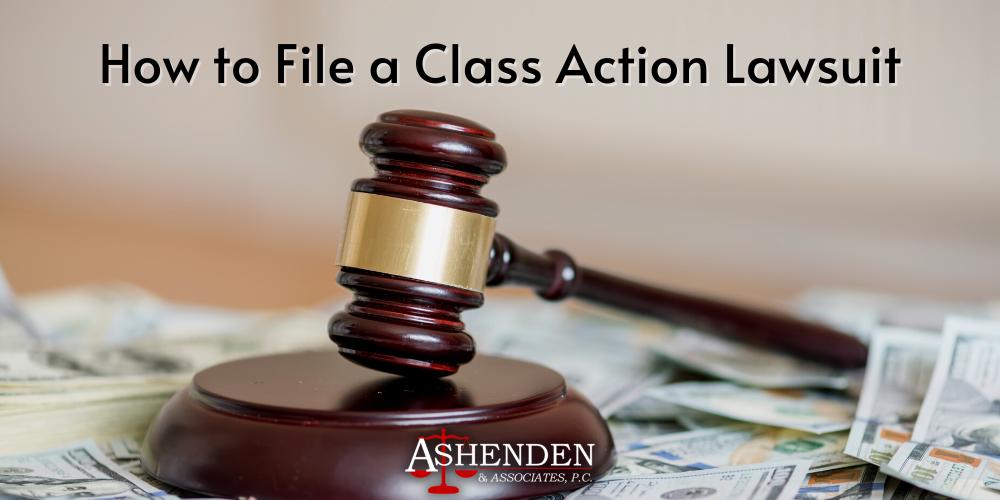To file a class action lawsuit in Atlanta or Sandy Springs, individuals must first establish a group with a similar claim and select a lead plaintiff or class representative to file on their behalf. Atlanta class action attorneys or Sandy Springs personal injury lawyers specializing in class action lawsuits can assist in organizing claims, whether for illegal business practices, product liability, or securities class actions.
After filing the class action lawsuit, the law firm will seek class certification by the court, affirming that the class action litigation meets federal rules for unified proceedings. The vast majority of class action lawsuits are resolved through settlement, which benefits class members by reducing the cost and expediting compensation without the need for an individual trial. If a trial is required, our Atlanta and Sandy Springs class action attorneys aim to maximize the benefit for all involved by working with insurance and other resources, helping clients avoid high costs on an individual basis with potential compensation for damages.
Contact an experienced personal injury lawyer at Ashenden & Associates to schedule a free consultation.

How to Join a Class Action Lawsuit in Atlanta or Sandy Springs, GA?
To join class action lawsuits in Atlanta or Sandy Springs, GA, start by determining if you qualify as a class member in an ongoing class action litigation case. Typically, a class representative or lead plaintiff files the lawsuit on behalf of the entire group of plaintiffs against the defendant.
An Atlanta class action attorney can guide you through the civil procedure requirements and how class action lawsuits work in Georgia, ensuring compliance with federal rules governing class action lawsuits. Your role as a class member does not usually require individual courtroom appearances, as the lead plaintiff and named plaintiffs represent the group. Most cases resolve through a settlement, allowing for shared compensation, often with insurance covering part of the payout. However, if the case proceeds to trial, your counsel and Atlanta class action attorney will advocate for maximum settlement benefits.
Mass Tort vs Class Action
Mass tort and class actions both involve groups of plaintiffs filing a claim against a defendant, but they differ in structure and legal approach. In class actions, all class members are part of a single claim with similar injuries or damages, and one Atlanta class action lawyer or firm often represents the entire group.
Mass torts, however, involve multiple lawsuits filed by each plaintiff, even though they share similar grievances, which are often consolidated in federal court. Each plaintiff in a mass tort receives individualized attention from counsel and may have distinct outcomes. Mass torts are commonly used when a business or manufacturer causes harm with a defective product, while class actions are more common for issues like fraud, where all members experience identical damages.
What is Putative Class Action?
A putative class action is a lawsuit filed by a class representative or more plaintiffs on behalf of a larger group of class members of individuals who were affected similarly or in the same way yet have been certified by the court. In the putative class action stage, the lawsuit aims to establish the eligibility of the number of the group, gathering evidence to show that the alleged issues affect a sufficiently large group, with each class member or at least the vast majority being affected in the same way or a similar way.
If the court grants class certification, the putative class action becomes certified, allowing every qualifying class member to participate or opt out of the lawsuit, seeking collective remedies against the defendant by one judge in one courtroom.
Common Types of Class Action Lawsuits in Georgia
Georgia class action lawsuits work because all plaintiffs have similar grievances. Typically a class action lawsuit is brought against a large corporation who has breached a duty of care in Georgia.
Common Georgia class action lawsuits include:

Defective Drugs and Medical Device Class Action Lawsuits
Each class action lawsuit claim arises from products that cause injury or severe side effects to users.
Ongoing cases for individuals harmed by defective hernia mesh implants causing complications. If you’ve been injured, contact our Sandy Springs hernia mesh lawsuit attorneys.
Class actions related to recalled Philips CPAP machines linked to respiratory issues and cancer from inhaling toxic foam particles. Contact the Sandy Springs class action attorneys from our law firm to learn more about filing a Sandy Springs Philips CPAP machine lawsuit.
Individuals join a class action lawsuit if they experience severe side effects or birth defects. Contact our Atlanta class action lawyer to file a Sandy Springs Lamictal lawsuit.
Patients who received defective hip implants, especially metal-on-metal models, may seek compensation for complications. The Sandy Springs hip replacement lawsuit alleges that manufacturers released faulty products without sufficient testing.
Patients who received defective hip implants, especially metal-on-metal models, may seek compensation for complications. The Sandy Springs hip replacement lawsuit alleges that manufacturers released faulty products without sufficient testing.
A victim treated with Tepezza for thyroid eye disease may be a class member if they develop hearing loss or tinnitus. The Sandy Springs Tepezza lawsuit alleges that Horizon Therapeutics failed to disclose these risks.
Individuals who experienced complications from the ParaGard IUD may be eligible to be class members for the Sandy Springs ParaGard IUD lawsuit.
Each class action lawsuit aims to help victims secure a fair settlement for damages. Contact our Sandy Springs class action attorney team to learn more.
Environmental and Toxic Exposure
These class actions target companies responsible for exposing communities to harmful chemicals. Our Sandy Springs class action attorney team has significant experience handling toxic exposure claims.
Involves claims that exposure to Roundup’s active ingredient, glyphosate, causes non-Hodgkin’s lymphoma. Call our law firm to learn more about filing a Sandy Springs Roundup lawsuit.
Military families and service members exposed to contaminated water are filing a Sandy Springs Camp Lejeune lawsuit related to cancer, birth defects, and neurological disorders. If you or a loved one has been affected by Camp LeJeune Birth Defects in Atlanta or Camp LeJeune Prostate Cancer in Atlanta or other adverse effects, contact our Sandy Springs class action lawsuit attorney team for a free consultation.
The Conyers Biolab Lawsuit involves respiratory injuries, birth injuries, business operations, and other financial setbacks related to chlorine gas in Atlanta and the surrounding areas.
Defective Consumer Products Class Action Lawsuits
Defective consumer products class action lawsuit claims are essential tools for consumer protection, allowing consumers harmed by unsafe products to seek justice collectively under product liability law. By promoting consumer protection, these actions ensure that companies face accountability and compensate individuals fairly, reinforcing product liability obligations for future safety.
The claim that hair relaxers contain toxic chemicals linked to reproductive cancers and other health issues. Our Sandy Springs hair relaxer lawsuit attorneys can help.
This claim alleges that the herbicide Paraquat is connected to Parkinson’s disease, affecting farmers and agricultural workers. Call our law firm to learn more.
Plaintiffs allege that contaminated products caused ovarian cancer and mesothelioma. If you’ve been injured, contact our law firm about filing a Sandy Springs talcum powder lawsuit.
This claim involves multiple lawsuits and clients who claim that cow’s milk-based formulas caused NEC in premature infants. The Sandy Springs NEC baby formula lawsuit alleges that manufacturers failed to warn of the risks. The pending NEC trial has attracted widespread interest.
Mass Transportation Accident Class Action Lawsuits
Mass transportation class actions allow groups of passengers injured to pursue a settlement collectively. For victims injured in bus accidents, our Atlanta MARTA bus accident lawyers can represent passengers in class actions under state law, helping secure a favorable settlement for damages.
Our personal injury lawyer group provides essential counsel to guide clients through a complex claim and negotiations. Victims benefit from pooling resources, as class actions allow them to work alongside others impacted by the same incident
Social Media Addiction Class Action Lawsuits
Social media class action lawsuits have emerged as a powerful way for individuals to seek a settlement for alleged harm caused by addictive platforms. Sandy Springs social media addiction lawsuit cases allow plaintiffs to band together, benefiting from the collective strength of class action practice in pursuing the claim against social media companies.
Our Sandy Springs and Atlanta class action attorneys provide essential counsel on legal strategy, helping level the playing field for clients against well-funded corporations. Insurance issues can arise as companies assess their exposure to these claims, and having experienced attorneys offers the additional benefit of strong representation. If necessary, our skilled attorneys are prepared to take these cases to trial to advocate for affected individuals.
Securities Class Actions
Common securities class action lawsuits typically arise when investors believe a company has violated securities laws, is operating under illegal business practices, or is causing financial losses due to misrepresentation, consumer fraud, or lack of disclosure. Here are some of the main types:
This involves alleged overcharging, and alleged false or misleading statements about a company’s financial health or business operations, leading to inflated stock prices and, eventually, securities class action lawsuit claims.
Cases arise when company executives or insiders use confidential information for personal trading gains before the information becomes public.
This involves a failure to disclose key issues—such as a pending single lawsuit or multiple lawsuits, financial instability, or regulatory investigations—and can lead to securities class action lawsuits if these omissions cause losses for shareholders.
In cases where executives or board members prioritize their own business interest over shareholders’ rights. Here, shareholders may file securities cases for breach of fiduciary duty in Georgia.
Other common securities class action lawsuits in Georgia include:
- Initial Public Offering (IPO) Misrepresentation
- Accounting Fraud
- Mergers and Acquisitions (M&A) Violations
- Stock Price Manipulation
These complex class actions aim to recover losses on behalf of investors who were negatively impacted by corporate misrepresentation, fraud, or omissions. Sandy Springs and Atlanta class action law firms, like Ashenden & Associates, often pursue these civil cases.
Open Class Actions in Georgia
At Ashenden & Associates, our Sandy Springs class action lawyer group can help with the following MDL claims and more:
- BioLab Chemical Plant Fire
- Buckhead Parking Boot Fees Settlement
- Geico Auto Loss Taxes
- Breyers Vanilla Ice Cream Labeling
- Peacock TV Automatic Renewal Billing
- IGK Dry Shampoo Benzene Contamination
- Clif Bar Misleading Labeling
- Tubi VPPA Violations Settlement
- Acella NP Thyroid False Advertising Settlement
- Toyota RAV4 Defective Batteries Lawsuit
Contact our Atlanta and Sandy Springs class action lawsuit law firm for a free consultation to learn more.

How Does a Class Action Lawsuit Work in Georgia?
A class action lawsuit allows a group of people, known as class members, to file a single lawsuit against a defendant on an issue that affects each class member in the same way or a similar way, saving time and cost while consolidating resources.
This process begins with class certification, where the court determines if the plaintiffs have enough in common to proceed as a group, often led by a lead plaintiff or named plaintiff representing the entire class. A country-wide claim can be handled as multidistrict litigation when cases from different states share similar issues, bringing them into one courtroom. Class actions follow specific federal rules to ensure a fair process under the Class Action Fairness Act.
Once class certification occurs, the lead plaintiff and like-minded plaintiffs all benefit from having a collective class representative and experienced legal representation, leveling the playing field against well-resourced defendants, often large businesses.
Class action litigation may lead to a large class action settlement or, if unresolved, go to trial. While many cases end in a class action settlement, a settlement requires court approval to protect all class members.
In rare instances, the Second Circuit may be involved in appeals, potentially affirming dismissal of the case. When insurance coverage applies, insurance proceeds can fund the class action settlement. The Mccarran Ferguson Act can sometimes impact the insurance proceeds aspect. In this putative class action format, the claim is not pursued on an individual basis, yet all class members share the benefit of a unified claim when they can work alongside others with similar grievances.
How Many People Do You Need for a Class Action Lawsuit in Georgia?
To start a class action lawsuit in Georgia, there is no fixed minimum number of plaintiffs required, but typically at least 40 class members strengthen the case. Under the Federal Rules of Civil Procedure, the court must first determine that there are enough plaintiffs to justify a class action lawsuit and that all plaintiffs share common legal claims. The lead plaintiff or class representative then acts on behalf of all plaintiffs, working with legal counsel to represent everyone’s interests efficiently.
Find a Sandy Springs or Atlanta Class Action Attorney
To join a class action lawsuit in Georgia, finding an Atlanta class action attorney or law firms experienced in class action lawsuits is essential. A reputable law firm will help guide the lead plaintiff or class representative through filing and organizing members to pursue a claim against the defendant effectively.
Our Atlanta and Sandy Springs class action lawyers specialize in using federal systems, maximizing cost resources, and working cases efficiently, whether through settlement or trial. When choosing class action lawyers in Sandy Springs, consider the law firm’s reviews and success in cases involving insurance or large-scale settlements. An experienced Sandy Springs and Atlanta class action attorney can provide invaluable counsel, especially when handling complex, high-stakes litigation.
Sandy Springs and Atlanta Class Action Lawyers
Our Sandy Springs and Atlanta class action lawyer team assists locals looking to join a class action lawsuit in Atlanta or Sandy Springs by representing victims in collective civil lawsuits against a common defendant. Our Sandy Springs class action attorney team offers the necessary counsel to guide plaintiffs through the legal process, whether pursuing a federal case or negotiating a settlement on their behalf.
Call our law firm at 770-394-8909 to schedule a free consultation today.

